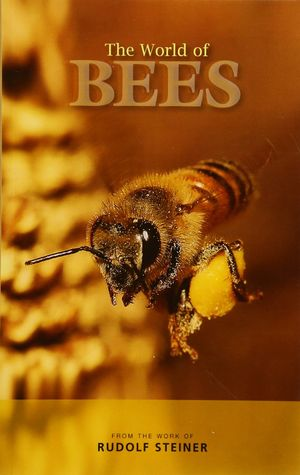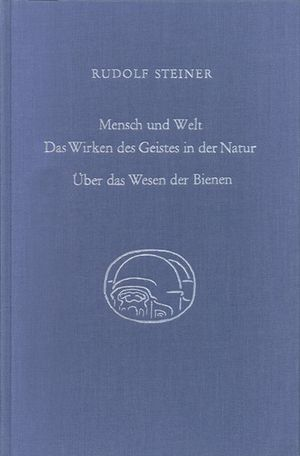GA 351



Man and World. The Work of the Spirit in Nature. On the Nature of Bees
Mensch und Welt. Das Wirken des Geistes in der Natur. Über das Wesen der Bienen
Volume V. - Fifteen Lectures, Dornach 8 October to 22 December 1923.
Contents (selection)
I. The Nature of Butterflies / On Hydrocyanic Acid and Nitrogen, Carbonic Acid and Oxygen / Man and Earth in the North and South / On the Nature of Hydrogen / On the Nature of Comets / Effectiveness of Substances in the Universe and in Human Beings / On the Causes of Infantile Paralysis. On Plant Growth
The butterfly, says Rudolf Steiner, is "... a flower blossom lifted into the air by light and cosmic forces". It is a being that develops from and through light, via a process of incorporation and internalization. By gazing into the world of these special and rarefied creatures, we can intuit that they, "... ray out something even better than sunlight: they shine spirit light out into the cosmos".
„The butterfly flutters above and over the earth, borne on the air and shimmering with light... We ought really to see them as nothing other than beings of light, joyous in their colours and the play of colours. All the rest is garment and luggage.“
Truly poetic and deeply esoteric, these lectures by Rudolf Steiner have been gathered here in a single volume for the first time, with an in-depth introduction that traces and explains the stages of butterfly metamorphosis. The emergence of the butterfly from its pupa is one of the most moving phenomena we can encounter in nature. In this creature's visible transformations, we can experience a revelation of spirit.
II Bee and Man / On the Perception of Bees / Honey and Quartz / About Honey / About the Gall Wasp / About Bee Venom and Ants / The Significance of Formic Acid / Clover Acid, Formic Acid, Carbonic Acid and Their Significance in Nature
„The whole hive is really pervaded by the life of love. The individual bees relinquish love but develop it instead throughout the hive. And so we start to understand bee existence if we recognize that the bee lives in an air, an atmosphere, that is entirely impregnated with love.“
Bees is essential reading for anyone interested in understanding the true nature of the honeybee, as well as those who wish to heal the contemporary crisis of the beehive. Bees includes an essay by David Adams, "From Queen Bee to Social Sculpture: The Artistic Alchemy of Joseph Beuys."
Rudolf Steiner’s unique talks reveal the hidden wisdom at work in bee colonies. Speaking in Switzerland in 1923, in response to concerns from beekeepers among his local workforce, Steiner delivered a series of addresses whose multi-layered content, structure and wording is unparalleled. In The World of Bees,editor Martin Dettli, a longstanding beekeeper, uses Steiner’s seminal bee lectures as the main framework of the book, augmenting them with further relevant passages from Steiner’s collected works. Dettli also provides substantial commentaries on the texts, placing them within the context of contemporary beekeeping.
Literature
- Rudolf Steiner, Matthew Barton (Translator): Butterflies: Beings of Light. Rudolf Steiner Press 2013. ISBN 978-1855843752; eBook ASIN B07N9MPD9R rsarchive.org
- Rudolf Steiner, Matthew Barton (Translator), Martin Dettli (Introduction): The World of Bees: From the Work of Rudolf Steiner. Rudolf Steiner Press 2018. ISBN 978-1855845404; eBook ASIN B07N9NXBYT rsarchive.org
- Rudolf Steiner, Thomas Braatz (Translator), Gunther Hauk (Introduction), David Adams (Afterword): Bees. 8 Lectures in Dornach, Nov 26, 1923 to Dec 22, 1923 (CW 351). Revised ed. edition. SteinerBooks 1998. ISBN 978-0880104579; eBook ASIN B0028N60WE rsarchive.org
- Rudolf Steiner: Nine Lectures on Bees. CreateSpace Independent Publishing Platform 1923. ISBN 978-1502717689; eBook ASIN B00O9EZWDI rsarchive.org
- Rudolf Steiner: Cosmic Workings In Earth and Man. Six lectures from CW 349, CW 350, CW 351, CW 352. Translated by, M. Cotterell, D. S. Osmond, V. E. Evans. Rudolf Steiner Publishing Company, London 1952 rsarchive.org
German
- Rudolf Steiner: Mensch und Welt. Das Wirken des Geistes in der Natur. Über das Wesen der Bienen, GA 351 (1999), ISBN 3-7274-3510-0 English: rsarchive.org German: pdf pdf(2) html mobi epub archive.org
 |
References to the work of Rudolf Steiner follow Rudolf Steiner's Collected Works (CW or GA), Rudolf Steiner Verlag, Dornach/Switzerland, unless otherwise stated.
Email: verlag@steinerverlag.com URL: www.steinerverlag.com. Index to the Complete Works of Rudolf Steiner - Aelzina Books A complete list by Volume Number and a full list of known English translations you may also find at Rudolf Steiner's Collected Works Rudolf Steiner Archive - The largest online collection of Rudolf Steiner's books, lectures and articles in English. Rudolf Steiner Audio - Recorded and Read by Dale Brunsvold steinerbooks.org - Anthroposophic Press Inc. (USA) Rudolf Steiner Handbook - Christian Karl's proven standard work for orientation in Rudolf Steiner's Collected Works for free download as PDF. |
